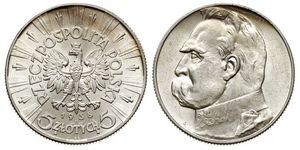1 Solidus Poland Copper
1763, Poland, Elbing (City), Augustus III. Copper Solidus Coin
Mint Year: 1763
Mint Place: Elbing
Reference: KM-105.
Denomination: Solidus
Material: Copper
Diameter: 16mm
Weight: 0.83gm
Elbląg (German: Elbing; Prussian: Elbings) is a city in the Warmian-Masurian Voivodeship, Poland, located in the eastern edge of the Żuławy region with 117,390 inhabitants, as of December 2021. It is the capital of Elbląg County. Elbląg is one of the oldest cities in the province. Its history dates back to 1237, when the Teutonic Order constructed their fortified stronghold on the banks of a nearby river. The castle subsequently served as the official seat of the Teutonic Order Masters. Elbląg became part of the Hanseatic League, which contributed much to the city’s wealth. Through the Hanseatic League, the city was linked to other major ports like Gdańsk, Lübeck and Amsterdam. Elbląg joined Poland in 1454 and after the defeat of the Teutonic Knights in the Thirteen Years’ War was recognized as part of Poland in 1466. It then flourished and turned into a significant trading point, but its growth was eventually hindered by the Second Northern War and the Swedish Deluge. The city was transferred to Prussia after the first partition of Poland in 1772. Its trading role greatly weakened, until the era of industrialization, which occurred in the 19th century. It was then that the famous Elbląg Canal was commissioned. A tourist site and important engineering monument, it has been named one of the Seven Wonders of Poland and a Historic Monument of Poland. After World War II the city again became part of Poland. The war casualties were catastrophic – especially the severe destruction of the Old Town district, one of the grandest in Prussia.
Augustus III (Polish: August III Sas, Lithuanian: Augustas III; 17 October 1696 – 5 October 1763) was King of Poland and Grand Duke of Lithuania from 1733 until 1763, as well as Elector of Saxony in the Holy Roman Empire where he was known as Frederick Augustus II (German: Friedrich August II).
He was the only legitimate son of Augustus II the Strong, and converted to Roman Catholicism in 1712 to secure his candidacy for the Polish throne. In 1719 he married Maria Josepha, daughter of Joseph I, Holy Roman Emperor, and became Elector of Saxony following his father’s death in 1733. Augustus was able to gain the support of Charles VI by agreeing to the Pragmatic Sanction of 1713 and also gained recognition from Russian Empress Anna by supporting Russia’s claim to the region of Courland. He was elected king of Poland by a small minority on 5 October 1733 and subsequently banished the former Polish king Stanisław I. He was crowned in Kraków on 17 January 1734.
Augustus was supportive of Austria against Prussia in the War of the Austrian Succession (1742) and again in the Seven Years' War (1756), both of which resulted in Saxony being defeated and occupied by Prussia. In Poland, his rule was marked by the increasing influence of the Czartoryski and Poniatowski families, and by the intervention of Catherine the Great in Polish affairs. His rule deepened the social anarchy in Poland and increased the country’s dependence on its neighbours, notably Prussia, Austria, and Russia. The Russian Empire prevented him from installing his family on the Polish throne, supporting instead the aristocrat Stanisław August Poniatowski, the lover of Catherine the Great. Throughout his reign, Augustus was known to be more interested in ease and pleasure than in the affairs of state; this notable patron of the arts left the administration of Saxony and Poland to his chief adviser, Heinrich von Brühl, who in turn left Polish administration chiefly to the powerful Czartoryski family.
(3205 X 1536 pixels, file size: ~586K)
Posted by: anonymous 2023-11-28
1763, Poland, Elbing (City), Augustus III. Copper Solidus Coin. Scarcer Date! Mint Year: 1763 Mint Place: Elbing Reference: KM-105. Denomination: Solidus Condition: Minor deposits, otherwise XF! Material: Copper Diameter: 16mm Weight: 0.83gm Elbląg (German: Elbing; Prussian: Elb ...
9 coin descriptions were improved from 2025-05-28 to 2025-06-04
One of them is:
1 Gulden Kingdom of the Netherlands (181 ...
group has 5 coins / 5 prices










-300-150-nRgsHgTyozIAAAGW7ltyjN9I.jpg)





